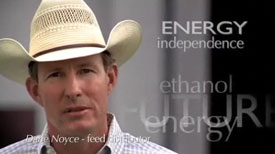Two guys and a Volkswagen Jetta running on biodiesel are trying to re-create the crazy coast-to-coast run made famous in the movie “Cannonball Run,” while proving the value of the green fuel they’re running on.
Hopefully, they’ll still be rolling along when you’re reading this, but right now (Monday evening at about 9:45 CST), two ad execs from Atlanta are in their first hour of what’s expected to be a 36-hour journey from New York City to Los Angeles… running on Willie Nelson’s BioWillie biodiesel… non-stop, except for switching drivers. In fact, Nik Bristow and Brian Pierce from Atlanta’s Fitzgerald+CO advertising firm won’t even stop for bathroom breaks (Check out some of their hilarious videos regarding the condom catheters they’ll be using).
If you’re tuning in before Wednesday, Sept. 24th at about 9 a.m., you might be able to catch some of their live UStream.tv video and chat with them from their web site: willierun.com.
Here’s a quick screen capture of what I saw when I tuned in Monday evening:
The video is pretty dark, but some of the comments are pretty funny (I love the one that I saw at about 30 minutes into the 36-hour drive “Are you there yet?”).
The important thing is Bristow and Pierce are drawing attention to biodiesel and its great fuel-saving abilities.



 There’s someone new for you to meet at the National Biodiesel Board.
There’s someone new for you to meet at the National Biodiesel Board.
 Last year, EPIC and fuel supplier VP Racing Fuels introduced E10 to the Series. This season, EPIC brought in E85 as one of the fuel options. Corvette Racing and Aston Martin Racing have chosen to use only E85 during the racing season.
Last year, EPIC and fuel supplier VP Racing Fuels introduced E10 to the Series. This season, EPIC brought in E85 as one of the fuel options. Corvette Racing and Aston Martin Racing have chosen to use only E85 during the racing season. 
 The first two summits were held in Washington DC, but organizers say “the transitional stasis of a federal election year and the accelerated ambition of the states to pursue their own alternative fuel programs, prompted a venue change to Florida which is rapidly proving to be a pioneer in the quest for renewable energy.”
The first two summits were held in Washington DC, but organizers say “the transitional stasis of a federal election year and the accelerated ambition of the states to pursue their own alternative fuel programs, prompted a venue change to Florida which is rapidly proving to be a pioneer in the quest for renewable energy.”
 The ABE facility is designed to produce 65 million gallons per year of ethanol using regionally grown barley as the primary feedstock. According to the company, barley can be grown in double-crop systems with established food crops such as soybeans in the Mid-Atlantic region.
The ABE facility is designed to produce 65 million gallons per year of ethanol using regionally grown barley as the primary feedstock. According to the company, barley can be grown in double-crop systems with established food crops such as soybeans in the Mid-Atlantic region.  The
The  In “Faces,” local Hereford residents explain why ethanol is critical to America’s energy future. In “Places,” the geographic diversity of America’s ethanol industry is on display as the self-proclaimed “Beef Capital of the World” is also home to two ethanol biorefineries.
In “Faces,” local Hereford residents explain why ethanol is critical to America’s energy future. In “Places,” the geographic diversity of America’s ethanol industry is on display as the self-proclaimed “Beef Capital of the World” is also home to two ethanol biorefineries. 
 In a
In a  The forum will feature both agricultural and food business leaders, including representatives from the National Corn Growers Association, Missouri Farm Bureau, the American Bakers Association, and the Food and Agricultural Organization.
The forum will feature both agricultural and food business leaders, including representatives from the National Corn Growers Association, Missouri Farm Bureau, the American Bakers Association, and the Food and Agricultural Organization.